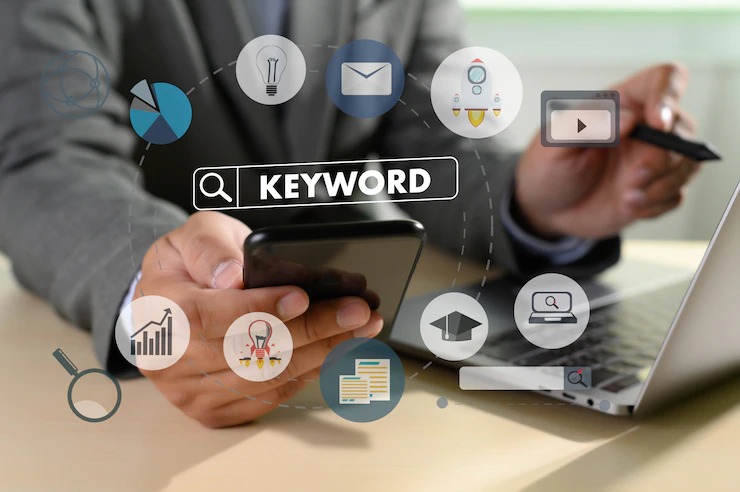We use cookies
This site uses cookies from cmlabs to deliver and enhance the quality of its services and to analyze traffic..
We use cookies
This site uses cookies from cmlabs to deliver and enhance the quality of its services and to analyze traffic..
Last updated: Nov 18, 2022

Disclaimer: Our team is constantly compiling and adding new terms that are known throughout the SEO community and Google terminology. You may be sent through SEO Terms in cmlabs.co from third parties or links. Such external links are not investigated, or checked for accuracy and reliability by us. We do not assume responsibility for the accuracy or reliability of any information offered by third-party websites.
In optimizing a website, there are many factors that must be considered in order to be on top of search results. On page SEO is one of the fundamental factors that need to be improved. In this guideline, we will explain in detail what is on page SEO, the goals of optimization, and how to improve it.
On page SEO is an optimization tactic done to help search engines understand the content in your website and make your site rank better. The focus of this optimization is improving the quality of content, so, it is important for you to create SEO-friendly articles to make it easier for readers and search engines to understand.
Search engines tend to display articles that are relevant to the keywords input by internet users. If the website owners implement a well-performing optimization, then search engines can understand your content and recommend it to internet users. Of course, this can make your content outperform its competitors.
Here are some of the on page SEO elements that can be optimized for your website:
You can optimize the elements related to content such as creating informative content, adding images, and creating attractive title tags and meta descriptions. On page SEO is also influenced by user experience which can be optimized through HTML code, URL structure, internal links, and other user experience metrics.
The goal of on page SEO is to optimize the internal factors of the website, especially content pages. If it is implemented properly, you can make content more SEO-friendly. In that way, the published content can be more easily understood by readers and search engines.
The essence of on page SEO is improving the quality of content. High-quality content has the potential to appear more often on search results pages. If the visibility of the content in search engines is high, then the goal and objectives of SEO can be achieved.

Web owners who are not familiar with SEO best practices often use on page SEO services to help optimize the performance of their websites. This article will help you find out how to optimize on page SEO so that you can optimize your website independently.
To make your content easier to understand by search engines and bring in more organic traffic without the help of on page SEO services, here we describe some ways on page SEO optimization can be done.
Keywords are words or series of words that are put by internet users when they search for something on search engines. If your content is relevant to these keywords, search engines will show your website to internet users via search results pages.
One of the important things to improve on page SEO is keywords. To optimize content in organic search results, you can choose keywords with high search volume and low competition. In addition, you must choose keywords that are relevant to your business, not just keywords that are popular today.
However, you should not repeat the use of keywords excessively. As a way of optimization, make sure the keyword density used is only around 1-2% so that the keywords can work more optimally. Check keyword density with cmlabs Words Counter.
Choosing the right keywords can increase the number of content impressions in search results. The more often the content is displayed, the more internet users will find your website. In that way, your site has the opportunity to increase its click-through rate (CTR) and conversion rate.
One way how to improve on page SEO is to pay attention to the placement of keywords in articles or your content. Here are the best positions you can distribute your keywords in:
Title
Google finds the topic of a website through the title tag, so it is important for you to put keywords in the title. In addition, potential audiences will only visit the sites with titles that are relevant to the keywords they are looking for.
The first paragraph
Usually, search engines will crawl the first 100-150 words in your content. So, it is important for you to put your keywords in the first paragraph so that crawlers can get a signal of relevance to your content.
Headings
Headings are used to determine important points in content, such as titles and subtitles. Putting keywords in the headings will help Google find the main topics covered in the content.
Slug
It would be best if you also put keywords in the slug or link of the article that is created. This tactic will make it easier for search engines to crawl and users to understand the topic presented in the content clearly.
Meta description
A meta description is one of the things that visitors consider when visiting your site. Therefore, the meta description is the strategic location to put keywords. An attractive meta description will make the audience curious about the full content.
Image caption
You also need to add image captions that contain keywords. Adding captions will make it easier for crawlers to index images so that organic performance on Google images performs better.
One of the elements of on page SEO is the heading tag. Using heading tags will provide a clear hierarchy in your content. Heading tags make it easier for users to understand the division of content and find the important topics they need.
The use of H1 and H2 tag structures is a way of improving on page SEO to make it easier for search engines to crawl and find important information from your site. Another step to improve on page SEO is to add keywords in heading tags if it is possible.
LSI stands for Latent Semantic Indexing. In writing content, the inclusion of LSI keywords can help users and search engines digest information comprehensively.
For example, content that explains SEO includes keywords such as "website," "optimization," and "query." Applying this method can enrich the information you present in the eyes of users and search engines.
Another element that can be optimized is internal links, which can show the linking between pages on your site. Implementing internal linking will make it easier for search engines to crawl. If it is possible, link your content on high-authority and well-performing pages for maximum optimization results.
Internal linking can improve the user experience by making it easier for users to navigate through your site. These links can also be used to increase conversion rates by directing users to pages containing business products.
Outbound links can be used as on page SEO optimization. By including high-quality links from trusted sources to support content delivery, readers are more likely to find useful information.
Providing information that answers a user's query is the same as offering a good page experience. It can also increase your page ranking on the SERP.
A good URL can be easily accessed by both users and search engines. A good URL structure to support on page SEO is a short URL that contains keywords so that search engines can clearly understand the topic of discussion in the content.
A good URL structure to support other on page SEO is URLs with clear formatting. Internet users also prefer short URL links. However, having a URL that describes the content is equally important.
Besides the content, things that must be considered in improving on page SEO are title tags and meta descriptions. A title tag is the title of the content that will be displayed on the search results page. The title is located at the top of each search result and can be clicked on to go to the intended web page. An attractive title will bring in more traffic and clicks.
Avoid titles that are too short or too long, it should be concise but able to clearly inform the topics of the content to the audiences. Ideally, the length of a title is only about 50-60 characters.
While the meta description is a brief explanation of the contents which is usually located under the title tag. The meta description must also be relevant to the content and should not be too long. The recommended length is around 400-750 pixels. Make the meta description as attractive as possible so that audience is interested in exploring the content on the full page.
To make it easier for content writers, cmlabs provides free tools, namely the Title & Meta Description Checker which functions to measure the title score and meta description of articles.
The most important element for improving on page SEO is content. Websites should provide content that is informative and relevant to the business and user needs. Content that is indicated as plagiarism will perform poorly in organic search results. Therefore, the content you create must be unique.
If your website provides high-quality and useful content, internet users will share it. In addition, the chances of other sites using yours as a referral will be higher. That way, trust in your site will increase.
Another element of on page SEO is adding relevant images to your content. To optimize images, you need to pay attention to file size and type. Make sure the file size is not too large so that it is not hampering the loading time of the site. The recommended file format is the WEBP format.
Adding alt tags and captions to images can also help search engines recognize the content of the images presented. In addition, you can also create an image sitemap to help search engines crawl your site thereby increasing the appearance of images in Google images.
One of the important on-page SEO methods to apply is to speed up website loading. Users naturally want to access information without waiting for long loading times. If the website page is difficult to load, then they will most likely abandon it.
Therefore, make sure that the website loading speed is measured in terms of performance, accessibility, and the right way to optimize based on the data obtained. To measure the loading speed of website pages, you can use the Page Speed Test from cmlabs.

An absolute way how to improve on page SEO is to create user-friendly content. Some of the criteria for user-friendly content are that it can be accessed quickly, it is easy to read and to be understood, have easy-to-access navigation, have consistency and clarity in layout, design, and labeling.
The length of the written content must also be considered. Make sure the content is not too long and does not take up a lot of time for readers to get the information they are looking for.
That is a complete guide on the meaning, elements, goals, and methods of on page SEO optimization. On page SEO goals cannot be achieved in one go, you have to make regular improvements to get the best results.
If you don't have the ability to optimize on page SEO yourself, then you can use on page SEO services provided by cmlabs. That way, you will get guidance and strategy recommendations from experts at the on page SEO service provider.
It doesn't stop there, then you can do off-page SEO optimization. Check out more information in the Off-Page SEO article.
WDYT, you like my article?